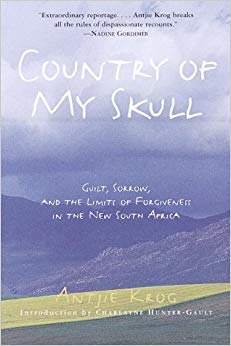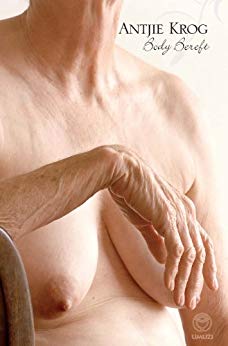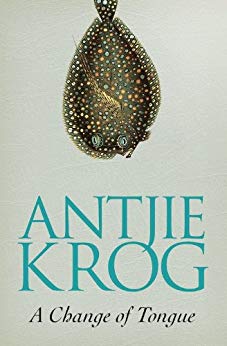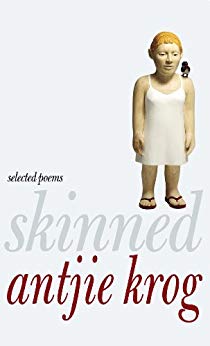Background
Antjie Krog was born on October 23, 1952, in Kroonstad, Free State, South Africa.

2018
Antjie Krog
2018
Antjie Krog
205 Nelson Mandela Dr, Park West, Bloemfontein, 9301, South Africa
Antjie Krog studied at the University of the Free State.
Lynnwood Rd, Hatfield, Pretoria, 0002, South Africa
Antjie Krog studied at the University of Pretoria
Preller St, Muckleneuk, Pretoria, 0002, South Africa
Antjie Krog studied at the University of South Africa.
Antjie Krog
Antjie Krog
Antjie Krog
Antjie Krog
Antjie Krog
Antjie Krog
Antjie Krog
Antjie Krog
Antjie Krog
Antjie Krog


















(Country of My Skull captures the complexity of the Truth ...)
Country of My Skull captures the complexity of the Truth Commission's work. The narrative is often traumatic, vivid, and provocative. Krog's powerful prose lures the reader actively and inventively through a mosaic of insights, impressions, and secret themes. This compelling tale is Antjie Krog's profound literary account of the mending of a country that was in colossal need of change.
https://www.amazon.com/gp/product/B000XUDG9Y/ref=dbs_a_def_rwt_hsch_vapi_taft_p1_i0
2007

(The resulting three-year collaboration, drawing on differ...)
The resulting three-year collaboration, drawing on different disciplinary and social backgrounds, has produced a fascinating account that leaves no detail of Mrs. Konile's narrative unexplored and poses questions about the unacknowledged assumptions that underpin research in this country. In addition, the book sheds light on the larger and highly relevant issues of how black and white South Africans can build bridges towards understanding one another across the cultural, social, and economic divides that threaten the country's democracy.
https://www.amazon.com/gp/product/1869141660/ref=dbs_a_def_rwt_hsch_vapi_taft_p1_i6
2009

(Body Bereft is a fearless and ecstatic exploration of con...)
Body Bereft is a fearless and ecstatic exploration of consciousness on the edge of decay and dissolution. The taboos within the tidal moods of the menopause are described with anger and verbal intensity in a voice that is uniquely Krog's. Close relationships are searingly explored, occasionally seeking conflict, often searching for resolution. These dramatic, even reckless poems, translated from the simultaneously published Afrikaans Collection, Veweerskrif, bring altogether new and unique energy to South African English-language poetry.
https://www.amazon.com/gp/product/B0050O9S3Q/ref=dbs_a_def_rwt_hsch_vapi_taft_p1_i7
2011

(Ranging freely and often wittily across many terrains, th...)
Ranging freely and often wittily across many terrains, this brave book by one of South Africa’s foremost writers and poets provides a unique and compelling discourse on living creatively in South Africa.
https://www.amazon.com/gp/product/B007TT3FWA/ref=dbs_a_def_rwt_hsch_vapi_taft_p1_i3
2012

(One of South Africa’s greatest living poets selects from ...)
One of South Africa’s greatest living poets selects from her most recent poems and also from the poems and the themes that best represent her from across her long career.
https://www.amazon.com/gp/product/B007YSKP10/ref=dbs_a_def_rwt_hsch_vapi_taft_p1_i9
2013
journalist writer academic poet
Antjie Krog was born on October 23, 1952, in Kroonstad, Free State, South Africa.
Antjie Krog grew up on a farm, attending primary and secondary school in the area. She completed her Bachelor of Arts degree with Afrikaans (cum laude), Philosophy (cum laude) and English at the University of the Orange Freestate and then she went on to obtain a Master's degree in Afrikaans at the University of Pretoria. She also completed a Teachers Diploma (cum laude) at the University of South Africa.
Krog first published her poetry, much of it erotic, in 1970 while she was still a teenager. Her 1981 collection, Otters in Bronslaai, is divided into two sections. In the first, she reflects on social criticism and personal experiences. In the next section, she writes about life as a wife and mother and how the associated tasks interfere with her writing. The third section contains light poetry for children. Krog concludes with six poems about the life of a heroic female, Susanna Smit. Henry Kratz wrote in World Literature Today that the poems “are very feminine and very much attached to the soil of South Africa, but at the same time the themes possess a general universality that goes far beyond the borders of this land. Krog uses crisp, evocative language and has a considerable gift for striking, even startling metaphors.”
The title of the poetry collection Jerusalemgangers refers to a group traveling to Jerusalem in the early part of the nineteenth century. The village of Nylstroom was founded at a point then thought to be the beginning of the Nile. Krog’s poems tell the story of the villagers, including their marriages, sexual relationships, and hostilities. In a World Literature Today review, Barend J. Toerien said the best poems include several about Africa and the black African. Toerien wrote that Krog’s poetry “derives its strength from its rough and unornamented diction, amplified with sharp and precise neologisms, which only rarely fail to be successful.”
Krog’s Lady Anne is a collection of poetry that compares the modern landscape of the Cape region of South Africa with that region when visited by Lady Anne Lindsay (Barnard) between 1797 and 1803. Krog relies on the correspondence of Lady Anne - a poet, letter-writer, and hostess of extravagant parties held in Cape Town castle - in reliving that woman’s experiences through poetry. Lady Anne’s letters also reveal her experiences in Paris during the French Revolution, experiences Krog compares to modern-day riots in South Africa. Reviewing Lady Anne in World Literature Today. Women's only criticism “is the annoying and unnecessary obscurity created by Krog’s occasional avoidance of punctuation.” Toerien added that Krog “fearlessly explores the power struggle in society, which she suggests echoes in the male-female relationship, and finds an affinity between power and money (geld) on the one hand and violence (geweld) on the other. The result is strong confessional poetry of the Lowell-Sexton-Plath variety.”
In reviewing Gedigte 1989-1995, Toerien called Krog “probably the strongest poetic talent in Afrikaans after Breyten Breytenbach.” He noted that while her earlier poems were carefully constructed through poetic devices and form, she eventually “abandoned such niceties ... as her strong feelings and statements seemingly are not to be reined in.” As a member of the African National Congress, Krog fought apartheid in South Africa; in this collection, she praises Nelson Mandela and calls up visions of protest marches. The first poem, “1995,” renounces political involvement. Toerien wrote that it should “perhaps be seen against her having been implicated by a ‘comrade’ in a political murder.” The critic also noted Krog’s erotic themes and her use of “course and crude words for the human genitalia” and called Gedigte “confessional poetry of the intimate kind.”
Krog serves as a parliamentary editor for South Africa Broadcasting Corporation. For two years she traveled the country with the Truth and Reconciliation Commission, led by Nobel Peace Prize-winner, Archbishop Desmond Tutu. The Commission heard from people who had suffered under the old system - as well as from the perpetrators of violence, torture, and murder - in an effort to heal and define a new old morality. Krog wrote Country of My Skull after covering the work of the Commission. In a Library Journal review, Edward O. Edwards called the book “a combination of reportage, memoir, and moral track” and a “compelling account.” Booklist reviewer Hazel Rochman found some of the details concerning reparations and infighting over amnesty “banal and boring. And yet, we need that messy background to distance the tearing truth of homes invaded and bodies blasted.” In a Foreign Affairs review, Gail M. Gerhart wrote that regarding the work of South Africa’s Truth and Reconciliation Commission “it is doubtful that a better book will be written.”
Krog delivered the keynote speech at the Zimbabwe Book Fair in 1998 and the Conference on Women and Violence organized by the World Bank in Washington 1998. She gave lectures on aspects of the Truth and Reconciliation Commission at the University of London, the University of Glasgow, the Universities in Essen and Dortmund in Germany, the University of Utrecht and at NIZA (Netherlands Instituut voor Zuider Afrika) in Holland, as well as during a South African week in Antwerp, Belgium. She gave a series of lectures on the concept of Justice within the Truth Commission ambit at the Universities of Bishops, Concordia, McGill, Carleton and Toronto in Canada, as well as the New York University and Bard College in the UN. She appears as a frequent guest on current affairs programs of the BBC, of Hilversum in the Netherlands, Belgium, Australia, Nieu Zealand, and America. She has been invited three times as a poet to participate in Poetry International at Rotterdam, Nacht der Poezie in The Hague and the Berlin Literatur festival. Was resident at the Foundation Royaumont for Poesie and Traduction where several of her poems had been translated into French. Krog formed part of the South African writers invited to Aix-en-Provence for the Cite de Livre in 1997 and was part of the La Caravane de la Poesie in 1999 - seven poets from Africa who traveled the ancient slave route from Goree back to Tombouctou. She also leads the English session at a Conference on Writing as a duty of Memory held in Rwanda. She is a Director of the Institute of Justice and Reconciliation.
Antjie Krog is a poet, writer, journalist and Extraordinary Professor at the University of the Western Cape. She published twelve volumes of poetry in Afrikaans, two volumes in English, and three non-fiction books: Country of my Skull (1998), on the South African Truth and Reconciliation Commission; A Change of Tongue (2004) about the transformation in South Africa after ten years and Begging to be Black (2009) about learning to live within a black majority. Country of my Skull And A Change of Tongue have been nominated by South African librarians (LIASA) as two of the ten most important books written in ten years of democracy. Krog has also co-authored an academic book There was this Goat (2009) with two colleagues Prof Kopano Ratele and Nosisi Mpolweni, investigating the Truth Commission testimony of Mrs. Notrose Nobomvu Konile. Her work has been widely translated. Krog had been awarded most of the prestigious awards for non-fiction, translation and poetry available in Afrikaans and English, as well as the Stockholm Award from the Hiroshima Foundation for Peace and Culture for the year 2000, as well as the Open Society Prize from the Central European University (previous winners were Jürgen Habermas and Vaclav Havel).
She has an Honorary Doctorate from the Tavistock Clinic of the University of East London UK, an Honorary Doctorate from the University of Stellenbosch, an Honorary Doctorate from the University of the Free State, an Honorary Doctorate from the Nelson Mandela Metropolitan University.
(Ranging freely and often wittily across many terrains, th...)
2012(One of South Africa’s greatest living poets selects from ...)
2013(The resulting three-year collaboration, drawing on differ...)
2009(Body Bereft is a fearless and ecstatic exploration of con...)
2011(Country of My Skull captures the complexity of the Truth ...)
2007
Quotations:
"It's hard for me to speak, whether in English or Afrikaans. The reason I write is because I cannot speak. I feel blunt."
"I'm a poet. I distrust anything that starts with a capital letter and ends with a full stop because people don't think in full, clear sentences."
"Why do we all need to sow this confusion? Is it because when we see things happening we're not sure what is true because it's a new country and we're not sufficiently long enough in it to read the codes?"
"Now, you think someone is not a human being but you have to call him sir. I'm interested in that kind of confrontation, the way people try to find new answers for old racist perceptions."
"If the lives of the poorest of the poor do not change, the whites will get the blame. And we will not be able to refute that."
Antjie Krog is married to architect John Samuel and has four children: Andries, Susan, Philip, and Willem and six grandchildren: Anouk, Antjie, Jana, Philip, Susie, and Antjie.

